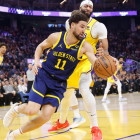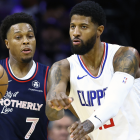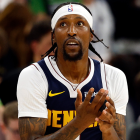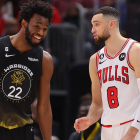The Philadelphia 76ers evened their second-round series on Monday with defense. After a discouraging Game 1 effort in which Toronto Raptors forwards Kawhi Leonard and Pascal Siakam scored 45 and 29 points, respectively, shooting a combined 74 percent and outscoring the Sixers' starters by themselves, coach Brett Brown made bold adjustments: Joel Embiid guarded Siakam, Ben Simmons guarded Leonard and forward Tobias Harris guarded Raptors center Marc Gasol.
Toronto scored a miserable 93.7 points per 100 possessions, its worst offensive performance since its Jan. 31 loss in Milwaukee. Siakam looked uncomfortable for the first time in the playoffs, shooting 9-for-25 and missing five of his seven 3-point attempts en route to 21 points. Leonard was terrific again, with 35 on 13-for-24 shooting, but his points didn't come easily and his teammates shot 20-for-67 (30 percent).
The Sixers didn't shoot well, either, but Jimmy Butler and Embiid made clutch plays and Raptors wing Danny Green, who was second in the league in 3-point percentage in the regular season, missed a wide-open 3 on a broken play that would have tied the game with 10 seconds left. This was enough for Philadelphia to earn a gutsy 94-89 win on the road in which Embiid played through knee soreness and a stomach bag that necessitated an infusion of intravenous fluids before the game.
This victory was at once impressive and an example of a team playing with fire and narrowly avoiding getting burned. After Game 1, and again just before Game 2, Brown noted that Toronto shot a league-best 41 percent from 3-point range after it acquired Gasol with 26 games left in the regular season, which made him wary of sending help to Leonard and forcing his team to rotate. The Sixers proceeded to send tons of help.
The Sixers built a 19-point lead in the first half despite surrendering shots like this wide-open Gasol 3, a result of three defenders converging on Leonard:
And this Gasol corner 3, in which Butler completely ignores Siakam, who screens Gasol's man, Greg Monroe:
In the second half, however, the Sixers' defense was not nearly as effective. Toronto scored 113.3 points per 100 possessions -- almost exactly what it averaged in its five consecutive wins preceding this game -- and that number would have been significantly higher if not for a disastrous stretch with reserves on the floor that spanned the end of the third quarter and the beginning of the fourth.
Look at how Philadelphia defended the Raptors when Leonard was out there with four bench players:
Yikes, Jodie Meeks. Anyway, Toronto could have overcome its rough start if its bench had scored more than five points or another jumper or two went in down the stretch. Here are Green and Kyle Lowry missing wide-open 3s after the defense collapsed on Leonard in the fourth quarter:
Good shooters should not be expected to make every clean look they get, and the takeaway here is not that the Sixers merely got lucky or Brown's adjustments were secretly bad. Some coaches believe that getting players in rotation defensively can galvanize them -- the idea is that they will play harder and with more focus because the game plan demands it. In between the two games, both Embiid and Simmons publicly said that they needed to get the ball out of Leonard's hands. Knowing that he wasn't completely on an island against Leonard, Simmons played one of the best defensive games of his life. Butler was clearly energized, too.
Brown's goal was to disrupt the flow of a team that had been rolling. The strategy worked: The Raptors were uncharacteristically discombobulated for much of the first half, giving Philadelphia a cushion when they stormed back. Over the next couple of days, though, I'll bet that Brown will be thinking about the late-game possessions that validated his fear of abandoning Toronto's shooters:
The Sixers deserve credit for changing things up and bouncing back. There is no guarantee, however, that this strategy will be successful again. All the clips above illustrate why Brown was hesitant to start the series this way, and the second half of Game 2 suggested that might not be sustainable. The beauty of the playoffs is that Game 3 will tell us more.


















